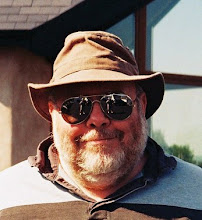I'm back on the subject of evolution. The modern society in which I live traces its roots to the societies similar to those we see depicted on natural history programs about New Guinea and Borneo and the Amazon. In these societes we see the men living in the long hut at the end of the village while the women and children occupy a scattering of huts nearby.
When a young man is born into this society, he lives in one of the scattering of huts where he is nursed and tended for by his mother and grandmother and aunties and older sisters. As he grows and matures he seeks the company of older boys and men and gravitates towards the long hut at the end of the village and the company of the older boys and men.
In their company he learns to tell tall stories, to smoke and drink and most crucially for my point, he learns how to find his way through the jungle to where the fat monkeys are. As soon as he can be trusted to join the hunt he and the older boys and the men set off through the jungle find the fat monkeys and return to village in triumph with the trophies of the hunt. The boy has become a man.
As young men do, the boy inevitably begins to notice the presence of females in his village and becomes fascinated by them. At this time he defers to the guidance of his mother, grandmother, aunties and sisters for advice on how to assuage his curiosity. Here he is advised which of the young women of the village are suitable objects for his affection and which young women should be left alone, such as his sisters, aunties and cousins. Again, my point being that this role requires the women of the village to acquire and retain this knowledge for the good of the tribe.
Following the advice of his mother, grandmothers, aunties and sisters the young man acquires his spouse and under the diretion of the tribe moves right to the edge of the village and builds a home or himself and his wife. Well out of earshot from the rest of the village the new family gets busy with raising the next generation. As the children inevitably arrive the mother is joined by the grandmother and an aunty or two. The young man find his appetite for female company starts to wane and he recalls fondly the sociable atmosphere of the long hut at the and of the village. So he spends more and more time at the long hut swapping tall tales with his peers, smoking and teaching the younger men the way to where the fat monkeys live. The circle is complete.
Which is why women remember birthdays and relationships and who is going out with (or married to or broken up with) whom, and why men have no trouble with directions. It's an evolutionary imperative.
Subscribe to:
Post Comments (Atom)

No comments:
Post a Comment